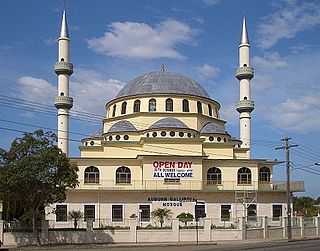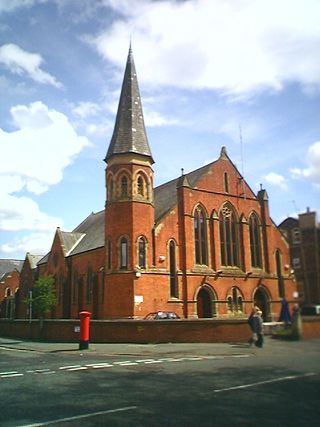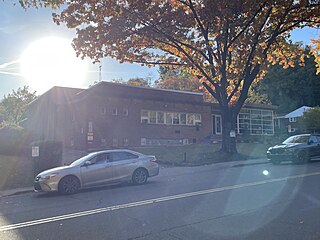
Eid al-Fitr is the earlier of the two official holidays celebrated within Islam. Eid al-Fitr is celebrated by Muslims worldwide because it marks the end of the month-long dawn-to-sunset fasting of Ramadan. Eid al-Fitr falls on the first day of Shawwal in the Islamic calendar; this does not always fall on the same Gregorian day, as the start of any lunar Hijri month varies based on when the new moon is sighted by local religious authorities. The holiday is known under various other names in different languages and countries around the world. The day is also called "Lesser Eid", or simply Eid.

The Finsbury Park Mosque, also known as the North London Central Mosque, is a five-storey mosque located next to Finsbury Park station close to Arsenal Football Club's Emirates Stadium, in the London Borough of Islington. It serves the local community in Islington and the surrounding boroughs of North London, and it is registered as a charity in England.

The Muslim Council of Britain (MCB) is an umbrella body of Muslim organisations in the United Kingdom, with over 500 affiliated mosques and organisations. It was formed in 1994 in response to British government's expressed wish for a single representative body of Muslims it could talk to. It has been called the best known and most powerful of the Muslim organisations founded since 1990. But its claims of being representative of British Muslims have been questioned. Since 2009, successive British governments have maintained a policy of "non-engagement" with the Muslim Council of Britain based on claims that the group is not sufficiently representative and that its officials have made favourable remarks about extremists in the past.

Islam is the second-largest religion in the United Kingdom, with results from the 2021 Census recording just under four million Muslims, or 6.0% of the total population in the United Kingdom. London has the largest population and greatest proportion (15%) of Muslims in the country. The vast majority of Muslims in the United Kingdom adhere to Sunni Islam, while smaller numbers are associated with Shia Islam.
There is a difference of opinion among Muslims regarding the circumstances in which women may act as imams, i.e. to lead a mixed gendered congregation in salat (prayer). The orthodox position is that women cannot lead men in prayer, which is justified by various Quranic verses and Hadith about the roles and responsibilities of men and women.

Abdul Rahman ibn Abdul Aziz al-Sudais, better known as al-Sudais, is the Chief Imam of the Grand Mosque, Masjid al-Haram in Makkah, Saudi Arabia; the President of the General Presidency for the Affairs of the Two Holy Mosques; a renowned Qāriʾ ; he was the Dubai International Holy Qur'an Award's "Islamic Personality Of the Year" in 2005. Al-Sudais has preached Islam's opposition to "explosions and terrorism", and has called for peaceful inter-faith dialogue, but also been criticized for vilifying non-Muslims and especially Jews in his sermons. He has denounced the treatment of Palestinians by Israeli settlers and the state of Israel, and called for more aid to be sent to Palestinians. He has also been noted for identifying women's un-Islamic behavior as in part responsible for the winter 2006 drought in Saudi Arabia. In 2016, he delivered the very important Hajj sermon to a multitude of pilgrims gathered at Arafat after prayers.

The Baitul Futuh is a mosque complex of the Ahmadiyya Muslim Community, situated in Morden, London. It is one of the largest mosque complexes in Europe. Completed in 2003 at a cost of £15 million, entirely from donations of Ahmadi Muslims, the Mosque can accommodate a total of 13,000 worshippers. The main mosque has a height of 23m above ground, and to maximise capacity the building extends below ground. Baitul Futuh is located in the south-west London suburb London Borough of Merton. It is situated next to Morden South railway station, 0.4 miles from Morden Underground station and one mile from Morden Road tram stop.

The Auburn Gallipoli Mosque is an Ottoman-style mosque in Auburn, a suburb of Sydney, New South Wales, Australia. More than 500 worshippers attend every day and around 2,000 worshippers attend the weekly special Friday prayer at the Auburn Gallipoli Mosque.

The East London Mosque (ELM) is situated in the London Borough of Tower Hamlets between Whitechapel and Aldgate East. Combined with the adjoining London Muslim Centre and Maryam Centre, it is one of the largest mosques in Western Europe accommodating more than 7,000 worshippers for congregational prayers. The mosque was one of the first in the UK to be allowed to use loudspeakers to broadcast the adhan.
There were 1,318,755 Muslims reported in the 2021 census in the Greater London area. In the 2021 census Office for National Statistics, the proportion of Muslims in London had risen to 15% of the population, making Islam the second largest religion in the city after Christianity.

The Ahmadiyya branch of Islam has been subjected to various forms of religious persecution and discrimination since the movement's inception in 1889. The Ahmadiyya Muslim movement emerged within the Sunni tradition of Islam and its adherents believe in all of the five pillars and all of the articles of faith required of Muslims. Ahmadis are considered non-Muslims by many mainstream Muslims since they consider Mirza Ghulam Ahmad, the founder of the movement, to be the promised Mahdi and Messiah awaited by the Muslims.

Didsbury Mosque is on Burton Road in West Didsbury, Manchester, England. The building was originally Albert Park Methodist Chapel, which opened in 1883, but closed in 1962 and was later converted into a mosque. It has an attendance of around 1,000 people. The mosque Sheikh is Mustafa Abdullah Graf.

The Shah Jahan Mosque on Oriental Road, Woking, England, is the first purpose-built mosque in the United Kingdom. Built in 1889, it is located 30 miles (50 km) southwest of London. It is a Grade I listed building.

The Islamic Centre of England Ltd (ICEL) is a religious and cultural building at 140 Maida Vale, London, whose mission is "to provide services to members of the Muslim community, in particular, and the wider community at large", focusing on religious guidance and cultural issues. It was founded in December 1995 and opened officially in November 1998. The premises are a former cinema that is a listed building.
The Inclusive Mosque Initiative (IMI) was founded in 2012, in London, UK. It is a grassroots activist organisation which works towards promoting the understanding of an intersectional feminist Islam. In practice, this means that IMI spaces and events are organised to be as inclusive as possible; unlike many existing mosques and religious organisations, IMI is not divided along linguistic, sectarian, political or ethnic lines. The organisation makes every effort towards providing disabled access to and within its venues, including British Sign Language (BSL) within its services, and giving translations of Arabic words when used.

Ahmadiyya is an Islamic movement in Australia, first formally founded in the country in the 1980s, during the era of the fourth caliph. However, the history of the Community dates back to the early 20th century, during the lifetime of the founder of the movement, Mirza Ghulam Ahmad, with the first contacts arising as a consequence of Australians travelling to British India, and also as a consequence of early, "Afghan" camel drivers settling in Australia during the mid to late 19th century. Today there are at least four Ahmadi mosques in four of the six Australian states, representing an estimated 6,000-8,000 Australian Ahmadis in the country.
On 19 June 2017, an Islamophobic terrorist attack occurred in Finsbury Park, London, England, when a van was intentionally driven into a crowd of Muslim pedestrians near the Muslim Welfare House, 100 yards (90 m) from the Finsbury Park Mosque, resulting in the death of a man and 11 injuries. The attack was found to be motivated by Islamophobia.
This is a list of individual liberal and progressive Islamic movements in Europe, sorted by country. See also Islam in Europe and Euroislam.

The Islamic Center of Pittsburgh is an Islamic educational, social services, and community outreach organization in the Oakland neighborhood of Pittsburgh, Pennsylvania. Founded in 1989, it is the largest mosque in the city, attracting 600 to 700 participants for weekly prayers. It provides social services for people of all religious backgrounds and engages in educational outreach and interfaith dialogue to foster community understanding and cooperation.

The Day of the Open Mosque in Germany is an annually scheduled event day that has existed since 1997 and takes place on October 3, the Day of German Unity. On this day, the mosque communities offer the predominantly non-Muslim visitors mosque tours, panel discussions and book and art exhibitions. Folklore, tea, coffee and pastries are also often part of the social program.















